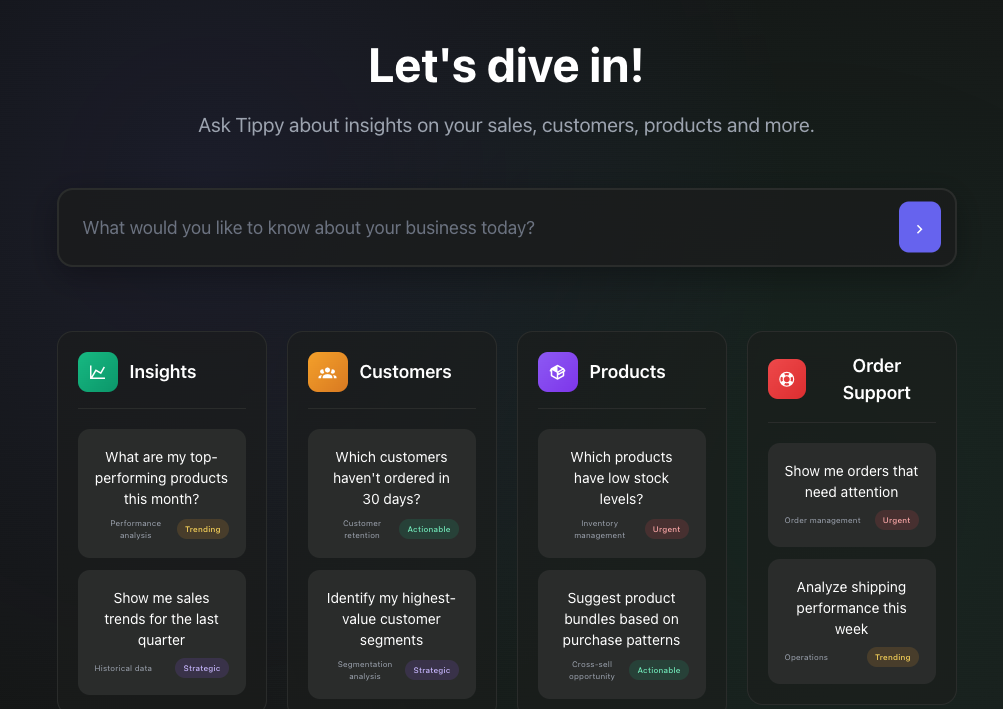Don’t miss out on the Christmas Season! 8 Key ways to prepare your B2B eCommerce
Prepare your B2B eCommerce for the Christmas season with streamlined operations, personalized promotions, and flexible payment terms to boost sales and loyalty.
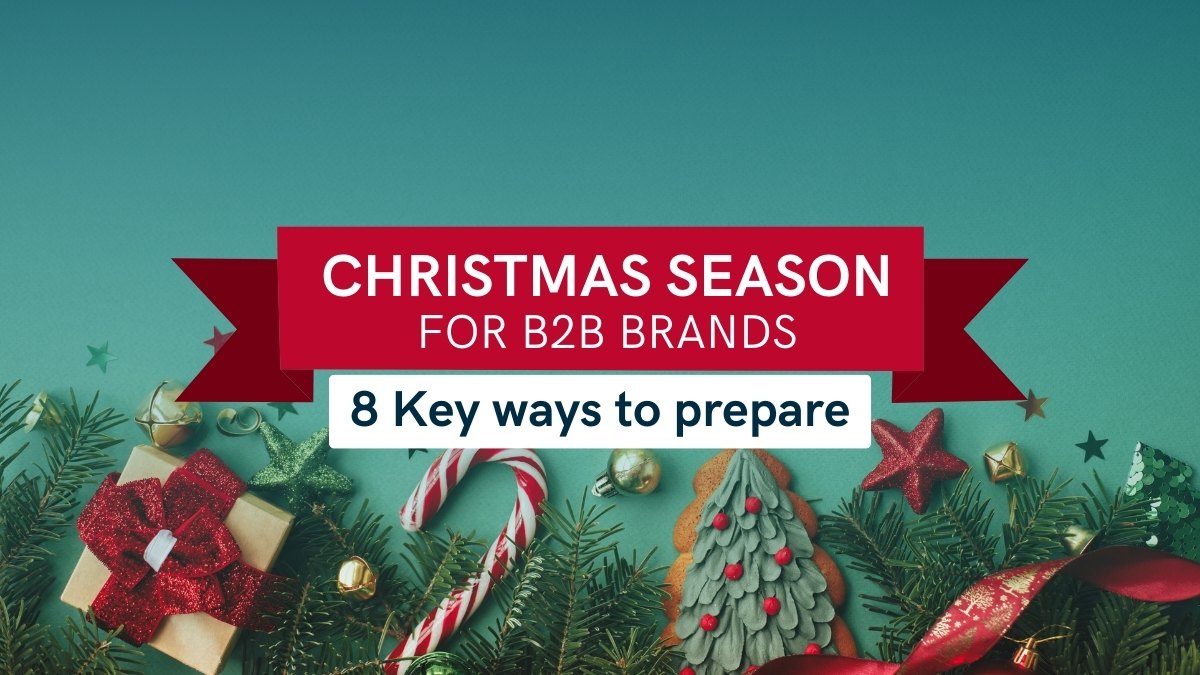
As the festive season approaches, the B2B eCommerce landscape in Europe sees a notable surge in activity. With Christmas being one of the busiest times of the year, B2B businesses in Europe experience a 20-30% increase in orders during the holiday season, as retailers and distributors rush to stock up for the holiday rush.
As more businesses turn to digital solutions, 64% of B2B buyers now prefer to make purchases online, making it essential for B2B brands to ensure their eCommerce setup is ready to handle the demand.
Table of Contents
- 1. Streamline your B2B eCommerce setup
- 2. Send newsletters with Offers and Discounts
- 3. Ensure adequate Stock level
- 4. Enable B2B Preorders for Christmas
- 5. Personalized Pricing and Discounts
- 6. Friendly Payment methods and Terms
- 7. Enhance your Shipping and Delivery process
- 8. Seamless B2B Checkout experience
- What you’re missing out on if you don’t prepare for the Christmas season
Whether you’re managing wholesale orders, restocking inventory, or introducing new holiday offers, preparing early can make all the difference. Here’s how B2B brands can optimize their operations to make the most of the Christmas season.
1. Streamline your B2B eCommerce setup
The holiday rush can put your B2B operations under pressure, which is why having a streamlined B2B eCommerce platform is crucial. Ensure that your platform is running smoothly, with features like:
- Automated order handling to reduce manual processes and prevent errors.
- Real-time stock updates to ensure retailers can see what’s available.
- B2B preorders to let retailers order stock ahead of time for guaranteed delivery before the holidays.
A seamless B2B eCommerce platform helps avoid hiccups during the peak season, ensuring your customers have a smooth and enjoyable buying experience.
2. Send newsletters with Offers and Discounts
Christmas is the perfect time to send personalized newsletters to your B2B buyers with tailored offers, discounts, and holiday promotions. According to recent data, 80% of B2B buyers appreciate receiving personalized offers that are relevant to their needs.
- Highlight exclusive holiday discounts.
- Showcase your new products or bundles designed for the season.
- Offer limited-time deals that create a sense of urgency, driving more orders.
Make sure your newsletter content is visually appealing, with engaging product images, clear calls to action, and easy-to-access links to your B2B eCommerce store.
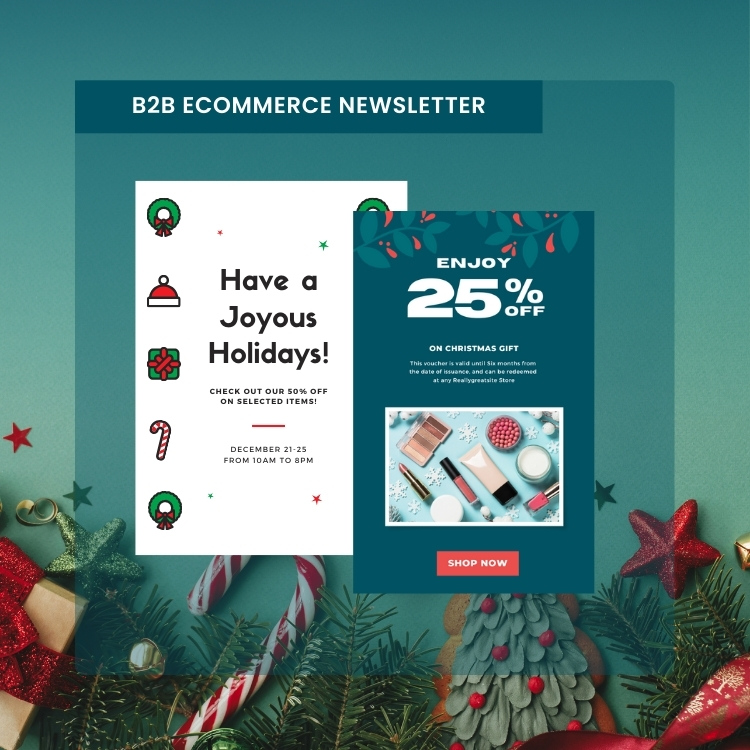
3. Ensure adequate Stock level
There’s nothing worse than running out of stock during the busiest time of the year. 58% of B2B buyers say stock availability is one of their top concerns when placing large holiday orders. So, make sure you’ve reviewed your stock levels well in advance of the Christmas rush.
Work closely with your suppliers to guarantee the availability of popular items, and update your B2B buyers if any delays or shortages are expected. Consider offering alternatives or bundles for any products that may be in short supply.
4. Enable B2B Preorders for Christmas
Preorders are a fantastic way to ensure your B2B buyers can plan ahead. Many retailers want to secure their stock early without waiting for it to become available. Offering a B2B preorder option allows your customers to place orders in advance, securing stock that can be delivered closer to the holiday season.
This not only guarantees future revenue for your business but also builds trust with your B2B buyers, ensuring they have everything they need for the Christmas period.
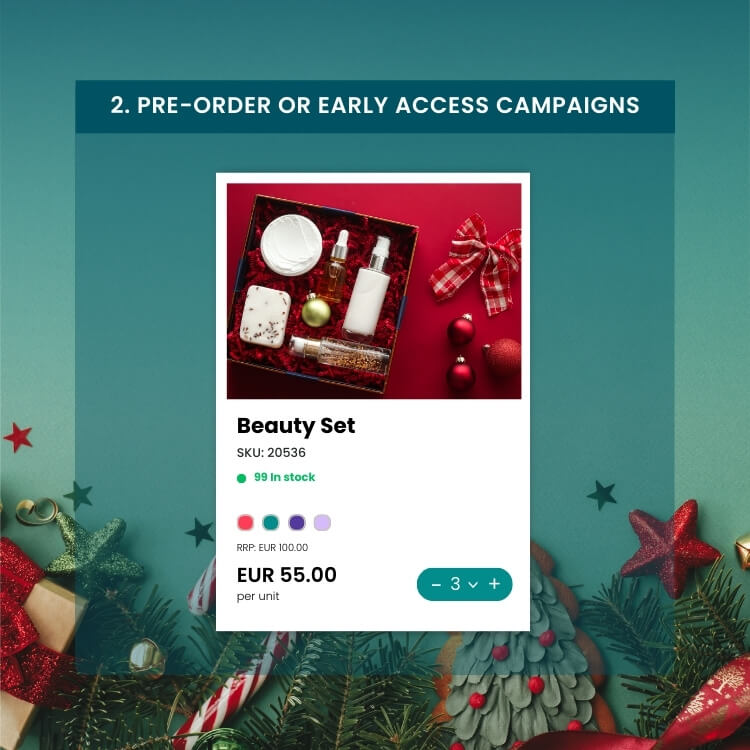
B2B Preorders
How to grow your B2B revenue with this eCommerce feature
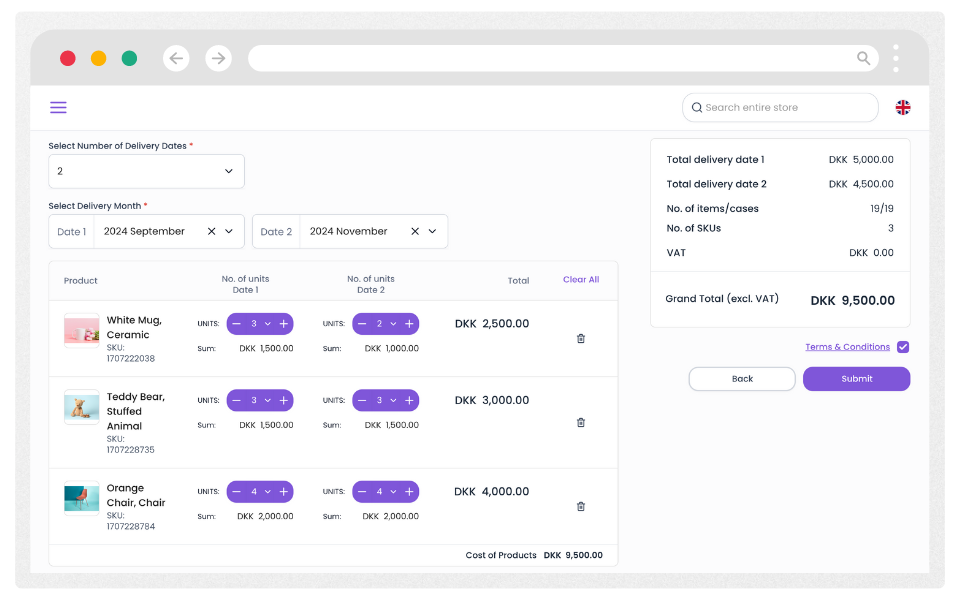
5. Personalized Pricing and Discounts
With Christmas being a key time for retailers to buy in bulk, personalized pricing can give you an edge over competitors. Offer volume discounts, custom price lists, or loyalty rewards to your regular B2B customers. This personalized approach will encourage repeat business and build stronger relationships as you head into the new year.
6. Friendly Payment methods and Terms
Payment flexibility is crucial during the holiday season. B2B buyers often appreciate extended payment terms, such as 60 or 90 days, to help manage their cash flow. By offering these friendly payment terms, you can make it easier for your retailers to stock up without straining their finances.
Additionally, ensure your checkout process offers multiple payment methods, including credit cards, bank transfers, or payment gateways like Stripe and Adyen. Providing a seamless, easy-to-use payment experience will encourage more purchases and reduce cart abandonment during the holiday season.
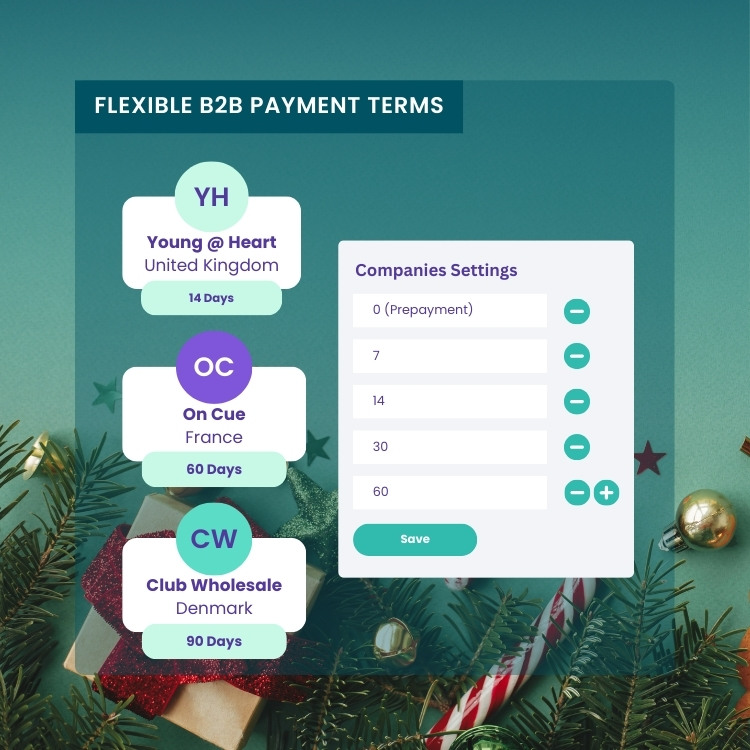
7. Enhance your Shipping and Delivery process
During the holiday season, on-time deliveries are essential. 60% of B2B buyers cite shipping speed as a major factor when choosing suppliers during the holiday rush. Make sure your delivery options are clear and that you communicate any cut-off dates for last-minute orders.
You may also want to offer expedited shipping for orders placed within a certain window, allowing your buyers to meet their own holiday demands without missing deadlines.
8. Seamless B2B Checkout experience
Ensuring a smooth B2B checkout experience during the Christmas season is crucial for maximizing sales. 83% of B2B buyers prefer a B2C-like checkout process, meaning your platform should offer:
- Multiple payment options, including wholesale payment agreements.
- Real-time order tracking to give buyers peace of mind.
- Personalized retailer login for a secure and tailored purchasing experience.
A seamless checkout encourages repeat purchases and reduces cart abandonment, helping you drive sales during the holiday rush.
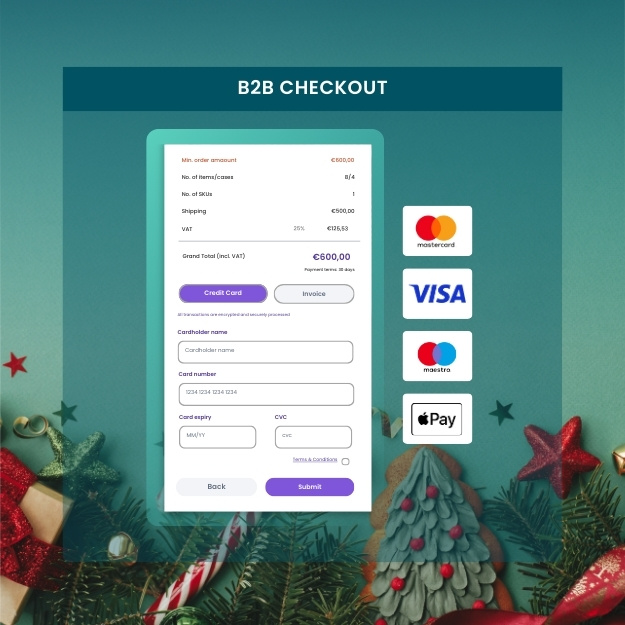
What you’re missing out on if you don’t prepare for the Christmas season
Failing to prepare your B2B eCommerce operations for the holiday season can lead to missed opportunities and potential losses. Here’s what your business stands to miss out on:
1. Lost B2B revenue
Without a clear strategy, you risk missing out on the significant increase in demand during the holiday season. The Christmas period often brings 20-30% higher sales for B2B businesses as retailers look to stock up for the busiest time of the year. By not preparing, you may not be able to meet this demand, leading to lost sales and disappointed customers.
2. Decreased customer loyalty
Your competitors are offering seamless, fast, and flexible buying experiences. If your B2B eCommerce platform isn’t up to scratch or you’re still relying on manual processes, your buyers may start looking elsewhere. 90% of B2B buyers would switch to a competitor if their needs aren’t met.
3. Increased operational stress
Without automating processes like order management, stock tracking, and checkout, your team will likely face bottlenecks. This can lead to delayed orders, errors, and an overwhelmed staff—resulting in a negative experience for your B2B buyers.
4. Missed Marketing opportunities
If you don’t take the opportunity to send personalized newsletters, offer holiday discounts, or create targeted campaigns, you’re losing out on a chance to engage your B2B buyers. 80% of buyers appreciate receiving tailored offers, and your competitors will likely be capitalizing on this.
5. Cash flow problems
Failing to offer extended payment terms like 60 or 90 days might put financial strain on your B2B buyers, causing them to reduce their order sizes or delay purchases. You could be missing out on higher-value orders simply because you didn’t provide flexible payment options.
By not preparing ahead, businesses could lose more than just sales—they risk losing long-term customer relationships, operational efficiency, and a competitive edge. So, it’s crucial to get your B2B eCommerce setup ready for the busiest time of the year!

Is your B2B eCommerce ready?
Find out how to prepare! Book a free 30-minute consultation today.
Related articles
START FREE TRIAL
Start generating more B2B orders today
Get a free preview. Import products from your B2C store

